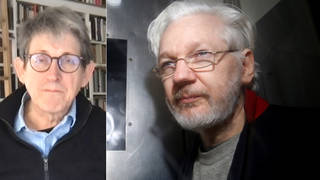
AMY GOODMAN: You’re representing Julian Assange, and I wanted to ask how you’ve gone from representing Guantánamo prisoners to representing Julian Assange, as the Swedish government attempts to extradite him from Britain, where you’re based, where Julian Assange is right now, to Sweden.
GARETH PEIRCE: It’s a pretty easy trajectory, I think. If one is to make an equivalency between circumstances, there are individuals, over the decades and the centuries, who stand up to be counted, who are vocal, who do brave things to talk about what is uncomfortable and what others don’t want to hear. And history tells us that those individuals will, by the states who consider their voices should not be heard, be in some way attacked. And it’s part of the narrative that’s perpetuated, the false narrative that makes people an enemy, makes whatever the state remove their protections under due process, because they say, “This is an exception. This is an exceptionalist crime, of such severity that we can—it’s right that we take away what restricts us in confining them.” And it’s not a million miles from men who were taken to Guantánamo or men who are being silenced by translating a text from Arabic into English, to people who think the world should know the dark secrets that are hidden and put them out on the internet. These are not enormous differences, but the way the state reacts, whether it’s your state or mine—the way the state reacts is actually identical in each case. It’s to perceive the person as the enemy and try to take them out.
AMY GOODMAN: Julian Assange has talked about being fearful that if he was extradited to Sweden, he could be extradited to the United States, and that he could be sent to Guantánamo. Is this a real fear?
GARETH PEIRCE: I think it’s not a real fear that he will be sent to Guantánamo. I think it is more than a real fear he will be subjected to extreme isolation and extreme punitive sentences, if convicted. And we have observed the situation of Bradley Manning and how he was confined and the extremities of the isolation he was subjected to. But we’ve also observed how there was something of an outcry about him, a protest, and that appeared to register, and his circumstances seem, just slightly, to have improved. And that informs us that it is right and appropriate to keep saying what is happening here is quite, quite wrong, intolerable, that people are punished as they attempt to assert a defense, attempt to argue back.
And I just gave as a comparator a case just starting of a man prosecuted in England now for translating texts and putting them out. But he’s on bail. He’s going each day himself to his trial on bail. And if convicted, his sentence would not be what he’d want. But it would be very, very, very much smaller than what will be imposed on Tarek [Mehanna].
AMY GOODMAN: And what is the latest in Julian Assange’s case?
GARETH PEIRCE: We wait for a High Court judgment.
AMY GOODMAN: When do you expect to hear that?
GARETH PEIRCE: We wait and wait.
AMY GOODMAN: And what would it mean if Julian Assange were isolated? What would it mean for WikiLeaks? What would it mean for what you think is important?
GARETH PEIRCE: I think all one can say about the infliction of isolation is it’s an attempt to destroy the human spirit and a human being, and therefore, however resilient the individual, and whoever that person is, then, in itself—it is being categorized, at this very moment, by the U.N. special rapporteur on torture, who just published a report—extended extreme isolation is itself a form of torture and is prohibited.











Media Options